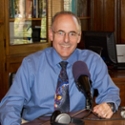February 17, 2017
Planetary Radio’s Mat Kaplan to serve as host for SIU’s eclipse festivities
 CARBONDALE, Ill. -- A well-known broadcaster in the field of space exploration will be on hand to host Southern Illinois University Carbondale’s total solar eclipse festivities.
CARBONDALE, Ill. -- A well-known broadcaster in the field of space exploration will be on hand to host Southern Illinois University Carbondale’s total solar eclipse festivities.
Mat Kaplan, host and producer of Planetary Radio, will help guide both radio listeners and the thousands of enthusiasts expected at SIU on Aug. 21 during the first total solar eclipse over the mainland United States since 1979.
The eclipse viewing path and shadow that day will sweep across the country from northwest to southeast, with its point of greatest duration a few miles south of Carbondale. Officials expect as many as 50,000 people to descend on the area for the happening.
The university’s planning, led by a campus-community committee, has been underway for more than a year. Kaplan signing on for the event will be a major benefit for all those who plan to witness it, officials said.
“We are fortunate to have Mat visiting campus and acting as host to thousands of visitors for the total solar eclipse,” said Bob Baer, specialist in the Department of Physics at SIU and co-chair of the university planning committee.
To learn more about the university’s plans for the eclipse, visit eclipse.siu.edu. Tickets for the Saluki Stadium eclipse events and parking are available at http://eclipse.siu.edu/tickets/.
For the past 15 years, Kaplan has hosted Planetary Radio, which plays on WSIU radio as well as another 150 radio stations and online, Baer said. The award-winning, weekly public radio and podcast series is produced by the Planetary Society and is, by most measures, the most popular independent program about space exploration on planet Earth.
Each episode strives to present illuminating and inspiring conversations with scientists and leaders in the fields of astronomy and space exploration, along with Planetary Society CEO Bill Nye, “the Science Guy,” and other regulars. The society was co-founded by Carl Sagan in 1980, and is the world’s largest and most influential non-profit space organization.
In cooperation with WSIU, Kaplan will host an event live from the SIU campus beginning the day before the eclipse before acting as emcee at Saluki Stadium on the day of the eclipse.
“I've told the folks at SIU who are planning the university's terrific lineup of eclipse events that I'm ready to be part of anything they need me for,” Kaplan said. “We're very proud that Planetary Radio is part of WSIU's great programming every week. It's all going to be enormous fun.”
Kaplan said eclipses have attracted humans’ attention for as long as we have been on Earth, and this latest one is no exception.
“They embody the wonder and science of our universe,” Kaplan said. “Our ancestors were understandably terrified, but we celebrate them. And this particular eclipse, which will be at least partially visible to so much of North America, is a rare opportunity for tens of millions to experience the great clockwork that is our solar system.”
Kaplan said this will be the first time he has witnessed a total eclipse and that doing so has been on the top of his “bucket list” for some time. The wonder of being in the zone of totality -- the regions on Earth where the sun will be completely covered by the moon -- is an especially moving experience for many, Kaplan said.
“Well, astronomers who have experienced many total eclipses tell me it will be a life-changing experience. It's no wonder we're all so excited,” he said. “I saw the aurora borealis in Fairbanks, Alaska, for the first time two years ago. I expect this will be even more thrilling. Of course, I'm also thrilled to know that I'll be sharing totality with at least 10,000 other eclipse fans in Saluki Stadium.”
Kaplan won’t have to wait until August to experience Southern Illinois, however. He’ll be visiting the area on April 22 to cover a pre-eclipse event for children at the Cedarhurst Center for the Arts in Mount Vernon.
“I'm told that hundreds of young people will get a preview of what we'll all experience on Aug. 21,” he said. “WSIU is co-sponsoring this great opportunity. I also look forward to exploring SIU during this visit, too.”
Kaplan said Nye hopes the eclipse will ignite or renew what he calls the passion, beauty and joy -- the PB and J -- of science.
“It's what the Planetary Society has been about since it was founded by Carl Sagan, Bruce Murray and Lou Friedman more than 35 years ago,” Kaplan said. “I know our more than 50,000 members and the well over 100,000 listeners to Planetary Radio will also join in this great celebration.”
SIU is partnering with NASA Eclipse 2017, the Adler Planetarium of Chicago and the Louisiana Space Consortium to bring a variety of events to campus on Aug. 21, with the main one being a public viewing at Saluki Stadium. Plans also call for tailgating, indoor viewing, talks and presentations, an arts and crafts fair, and an area dedicated to eclipse citizen science. NASA Eclipse 2017 also has proposed a NASA Village that will be part of campus events.
Baer said eclipse subcommittees are continuing planning efforts for campus events. He said organizers have collected input from 14 campus and community groups on proposed eclipse activities on the campus the weekend and day of the eclipse.
Groups still wanting to submit activity proposals should visit eclipse.siu.edu for information.
